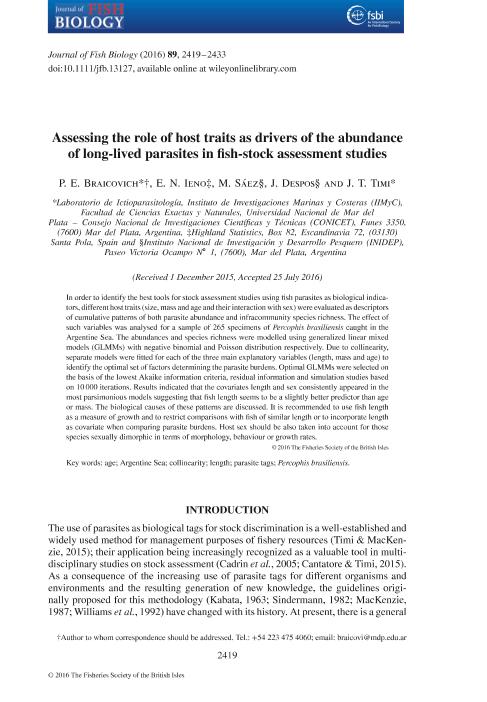Mostrar el registro sencillo del ítem
dc.contributor.author
Braicovich, Paola Elizabeth

dc.contributor.author
Ieno, E. N.
dc.contributor.author
Sáez, M.
dc.contributor.author
Despos, J.
dc.contributor.author
Timi, Juan Tomas

dc.date.available
2018-11-14T18:48:51Z
dc.date.issued
2016-11
dc.identifier.citation
Braicovich, Paola Elizabeth; Ieno, E. N.; Sáez, M.; Despos, J.; Timi, Juan Tomas; Assessing the role of host traits as drivers of the abundance of long-lived parasites in fish-stock assessment studies; Wiley Blackwell Publishing, Inc; Journal of Fish Biology; 89; 5; 11-2016; 2419-2433
dc.identifier.issn
0022-1112
dc.identifier.uri
http://hdl.handle.net/11336/64502
dc.description.abstract
In order to identify the best tools for stock assessment studies using fish parasites as biological indicators, different host traits (size, mass and age and their interaction with sex) were evaluated as descriptors of cumulative patterns of both parasite abundance and infracommunity species richness. The effect of such variables was analysed for a sample of 265 specimens of Percophis brasiliensis caught in the Argentine Sea. The abundances and species richness were modelled using generalized linear mixed models (GLMMs) with negative binomial and Poisson distribution respectively. Due to collinearity, separate models were fitted for each of the three main explanatory variables (length, mass and age) to identify the optimal set of factors determining the parasite burdens. Optimal GLMMs were selected on the basis of the lowest Akaike information criteria, residual information and simulation studies based on 10 000 iterations. Results indicated that the covariates length and sex consistently appeared in the most parsimonious models suggesting that fish length seems to be a slightly better predictor than age or mass. The biological causes of these patterns are discussed. It is recommended to use fish length as a measure of growth and to restrict comparisons with fish of similar length or to incorporate length as covariate when comparing parasite burdens. Host sex should be also taken into account for those species sexually dimorphic in terms of morphology, behaviour or growth rates.
dc.format
application/pdf
dc.language.iso
eng
dc.publisher
Wiley Blackwell Publishing, Inc

dc.rights
info:eu-repo/semantics/openAccess
dc.rights.uri
https://creativecommons.org/licenses/by-nc-sa/2.5/ar/
dc.subject
Age
dc.subject
Argentine Sea
dc.subject
Collinearity
dc.subject
Length
dc.subject
Parasite Tags
dc.subject
Percophis Brasiliensis
dc.subject.classification
Otras Ciencias Biológicas

dc.subject.classification
Ciencias Biológicas

dc.subject.classification
CIENCIAS NATURALES Y EXACTAS

dc.title
Assessing the role of host traits as drivers of the abundance of long-lived parasites in fish-stock assessment studies
dc.type
info:eu-repo/semantics/article
dc.type
info:ar-repo/semantics/artículo
dc.type
info:eu-repo/semantics/publishedVersion
dc.date.updated
2018-11-05T19:56:48Z
dc.identifier.eissn
1095-8649
dc.journal.volume
89
dc.journal.number
5
dc.journal.pagination
2419-2433
dc.journal.pais
Reino Unido

dc.journal.ciudad
Londres
dc.description.fil
Fil: Braicovich, Paola Elizabeth. Consejo Nacional de Investigaciones Científicas y Técnicas. Centro Científico Tecnológico Conicet - Mar del Plata. Instituto de Investigaciones Marinas y Costeras. Universidad Nacional de Mar del Plata. Facultad de Ciencias Exactas y Naturales. Instituto de Investigaciones Marinas y Costeras; Argentina
dc.description.fil
Fil: Ieno, E. N.. Highland Statistics; España
dc.description.fil
Fil: Sáez, M.. Instituto Nacional de Investigaciones y Desarrollo Pesquero; Argentina
dc.description.fil
Fil: Despos, J.. Instituto Nacional de Investigaciones y Desarrollo Pesquero; Argentina
dc.description.fil
Fil: Timi, Juan Tomas. Consejo Nacional de Investigaciones Científicas y Técnicas. Centro Científico Tecnológico Conicet - Mar del Plata. Instituto de Investigaciones Marinas y Costeras. Universidad Nacional de Mar del Plata. Facultad de Ciencias Exactas y Naturales. Instituto de Investigaciones Marinas y Costeras; Argentina
dc.journal.title
Journal of Fish Biology

dc.relation.alternativeid
info:eu-repo/semantics/altIdentifier/doi/https://doi.org/10.1111/jfb.13127
dc.relation.alternativeid
info:eu-repo/semantics/altIdentifier/url/https://onlinelibrary.wiley.com/doi/abs/10.1111/jfb.13127
Archivos asociados
